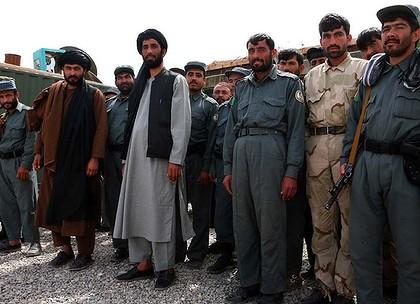Philip Dorling
Senior Defence Department officials feared the WikiLeaks exposť of secret US military reports would undermine public support for the Australian Defence Force in Afghanistan, according to newly released briefing papers.
Reports about a corrupt Afghan warlord who works closely with Australian special forces were considered particularly sensitive.
More than two years after WikiLeaks published more than 75,000 leaked US reports on Afghanistan, the Defence Department has finally released, under freedom-of-information law, its assessment of the massive security breach.
In a confidential brief submitted to the former defence minister John Faulkner, Defence warned that WikiLeaks's July 2010 release of the ''Afghan War Logs'' was a matter of high political sensitivity that "could adversely affect public perceptions of the [International Security Assistance Force] campaign, [and] ADF operations in Afghanistan''.

Matiullah Khan, centre in grey, stands with co-workers deciding who may use the road between Kandahar and Tarin Kowt. (Photo: The Sydney Morning Herald)
Although Defence advised that WikiLeaks did not compromise the safety of Australian soldiers, the department's deputy secretary, Peter Jennings, highlighted the website's disclosures concerning the Afghan warlord Matiollah Khan, ''an influential figure based in Oruzgan province who has worked with US and Australian forces over the course of several years''.
Although some of the Defence briefing concerning the warlord has been redacted on national security grounds, reference was made to ''WikiLeaks materials describ[ing] some of Matiollah Khan's operations, an incident where his brother was given what appears to be special treatment by US troops, and an incident where a suicide bomber attempted to infiltrate his compound''.
However, the leaked US military reports reviewed by Defence also included references to ''credible accounts" that Mr Khan "operates protection rackets, skims from the [police] payroll, and is involved in the illegal narcotics trade''.
Appointed the Oruzgan police chief in 2011, Mr Khan has earned more than $45 million from NATO and Australian construction, fuel and security contracts. Dutch forces in Oruzgan refused to work with the warlord who is suspected of extortion, torture and having dealings with the Taliban insurgency.
Another US report released by WikiLeaks showed the US embassy in Kabul warned the heroin trade in Oruzgan was ubiquitous, infecting all aspects of the provincial administration and ''corrupting public officials''.
However Australian officials publicly insist that Oruzgan's governor and other officials, including Mr Khan, have improved services and opposed corruption. Mr Khan continues to be a key Australian ally, working closely with Australian special forces and some of his militia fighters have trained with the ADF in Australia.
The released briefing papers show the government waited more than two months, until October 24, 2010, before publicly acknowledging that WikiLeaks had not harmed ADF operations or security.
The Prime Minister, Julia Gillard, announced in April that the ADF will withdraw from Afghanistan before the end of next year, a year ahead of schedule.
The WikiLeaks website has been offline for the past week owing to a massive distributed denial of service attack allegedly conducted by American hackers.



